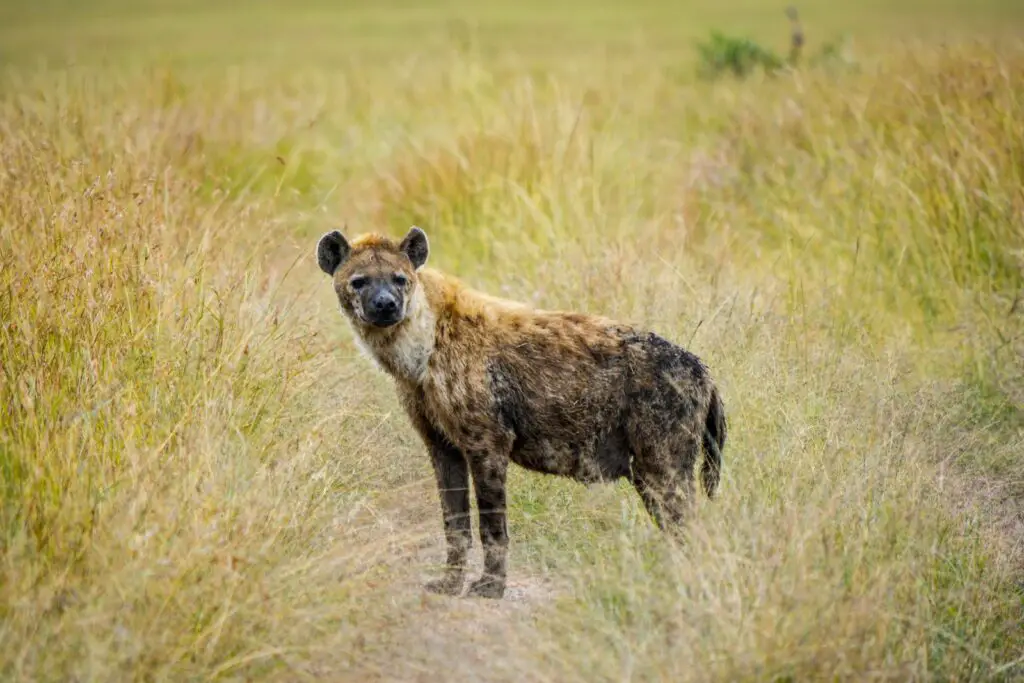Are Hyenas dangerous? Can they be friendly?
Are Hyenas dangerous?
Hyenas can be dangerous to humans, particularly when threatened or provoked. While hyenas are not known to actively seek humans as prey, they can become aggressive if they feel threatened or encroached on their territory.
Hyenas are known for their ability to take down large prey due to their strong jaws and sharp teeth.
They are also extremely fast and have the ability to outrun humans over short distances.
Furthermore, hyenas are known for their scavenging behaviour, and if given the opportunity, they will not hesitate to steal food or resources from humans.
Hyenas are well-known for their aggressive behaviour towards both other animals and humans.
They are extremely territorial and will attack intruders in order to defend their territory.
Hyenas have also been observed scavenging from human settlements, and they may become accustomed to humans as a food source, leading to more dangerous behaviour towards humans.
While hyenas are not usually considered a threat to humans, there have been reports of them attacking people. This could be due to human encroachment on hyena habitat or accidental encounters in some cases. In other cases, the hyena may be feeling threatened or cornered.
Hyenas are known for their intelligence and social behaviour, in addition to their physical abilities. They live in clans and have a complex social hierarchy, with the dominant female or male group leader.
Hyenas are also extremely adaptable, surviving in a wide range of environments, from savannas to forests to deserts.
Finally, while hyenas are rarely dangerous to humans, they should be treated with caution and respect. Humans should avoid approaching or provoking hyenas and take precautions to avoid conflicts with these animals, such as securing food and waste.
It is also important to remember that hyenas, as scavengers and predators, play an important role in their ecosystems and should be protected and conserved.

Are hyenas dangerous to other animals as well?
Yes, hyenas can be harmful to other animals. In fact, they are apex predators in their ecosystems, hunting and killing a wide range of prey, including large mammals like wildebeest, zebras, and buffalo.
They are also opportunistic scavengers, meaning they will eat carrion if it is available.
Hyenas have a number of adaptations that allow them to be effective hunters and scavengers.
They have strong jaws and teeth that can crush bones and rip flesh.
They also have an acute sense of smell and can detect the scent of carrion from great distances.
Furthermore, hyenas have a high tolerance for toxins and can digest food that is too tough or rotten for other predators to consume.
Hyenas are also known for their teamwork when hunting. They hunt in packs and can take down prey much larger than themselves.
They employ a variety of strategies, such as chasing prey to exhaustion and biting at the legs and hindquarters to bring it down.
Finally, hyenas are apex predators that can pose a threat to other animals.
They are skilled hunters and scavengers with strong jaws, acute senses, and cooperative hunting behaviour.
However, as top predators and scavengers, they play an important role in their ecosystems and should be conserved and protected.
Can Hyenas be friendly to humans?
Hyenas can become friendly with humans, but this is a rare occurrence that should not be expected. Hyenas are wild animals with instincts and behaviours shaped by their environment and experiences.
Humans are typically regarded as a threat or as potential prey by hyenas. Hyenas may become habituated to humans in some cases if they are regularly fed or live in close proximity to human settlements. However, this is not a good situation for the hyena because it can lead to aggressive behaviour and reliance on humans for food.
In general, approaching or attempting to befriend hyenas or other wild animals is not advised.
Humans should respect and observe wild animals from a safe distance, and they should not interfere with their natural behaviours or habitats.
It is also important to remember that feeding wild animals, including hyenas, is illegal and can be harmful to both the animals and humans involved.
To summarise, while hyenas can become friendly to humans, this is not a common occurrence and should not be expected.
Humans should respect and observe hyenas from a safe distance, and they should not interfere with their natural behaviours or habitats.
Is a hyena more dangerous than a lion?
Both lions and hyenas are apex predators in their respective ecosystems and can be dangerous to humans and other animals.
However, comparing their danger levels is difficult because it depends on a variety of factors such as the species, gender, size, and behaviour of the individual animals, as well as the circumstances of the encounter.
Lions are generally larger and more powerful than hyenas, making them more formidable predators. They are well-known for their strength, speed, and agility, and can easily take down large prey.
Lions have a social structure that allows them to hunt and defend their territory together.
Hyenas, on the other hand, are smaller and more agile than lions, but have a reputation for endurance and tenacity. They can outlast other predators in hunting and scavenging, and they frequently steal kills from larger predators like lions.
When it comes to human aggression, both hyenas and lions can be dangerous if they feel threatened or provoked. Lion attacks on humans, on the other hand, are better documented than hyena attacks, and lions have been known to actively seek out humans as prey in certain situations.
To summarise, hyenas and lions are both dangerous predators that must be respected and observed from a safe distance. However, comparing their danger levels is difficult because it depends on a variety of factors, and each species has its own distinct characteristics and behaviours.
Can you survive a hyena attack?
Surviving a hyena attack is possible, but it is dependent on a number of factors, including the size and strength of the hyena, the number of hyenas involved, and the location and severity of the injuries sustained.
Hyenas are formidable predators with powerful jaws and razor-sharp teeth, capable of inflicting serious injuries on their prey or attackers.
They frequently attack the legs and hindquarters of their prey, causing severe muscle and tissue damage.
In the event of a hyena attack, it is critical to try to protect and defend yourself as best as possible. This could include fending off the hyena with weapons or objects, or attempting to escape by climbing a tree or other high object.
It is also critical to seek medical attention as soon as possible because hyena bites and scratches can become infected and require antibiotics or other medications to treat.
To summarise, while surviving a hyena attack is possible, it is critical to take precautions to avoid such an encounter in the first place. If an attack occurs, it is critical to protect oneself and seek medical help as soon as possible.
Are hyenas aggressive?
Hyenas can be aggressive, particularly when threatened or defending their territory or young.
Their level of aggression, however, varies depending on the hyena’s species, gender, age, and individual personality.
Spotted hyenas, for example, have a reputation for being aggressive and territorial. They live in large clans and are fiercely protective of the territory and resources of their clan. They have been observed attacking and killing other predators, including lions, and defending their kills and dens from intruders.
Striped hyenas, on the other hand, prefer solitude and are less aggressive than spotted hyenas. They are scavengers who eat carrion and will hunt small prey if necessary. They are shy and secretive, and will usually avoid confrontations with larger predators or humans.
Hyenas can also be aggressive to one another, especially when competing for food or mating opportunities.
Hyenas may use vocalisations, physical aggression, or posturing to establish dominance or resolve conflicts in these situations.
While hyenas can be aggressive, they generally avoid human contact and will only attack if they feel threatened or cornered.
However, keep in mind that hyenas are wild animals that should be respected and observed from a safe distance.
Finally, hyenas can be aggressive when defending their territory or resources, but their level of aggression varies depending on the species and individual personality of the hyena.
While hyenas generally avoid human contact, it is important to remember that they are wild animals that should be respected and observed from a safe distance.
Can a single hyena kill an adult human?
It is unlikely that a single hyena could kill an adult human on its own, but it is not impossible under certain conditions.
Hyenas are formidable predators with powerful jaws and razor-sharp teeth capable of inflicting serious injuries on their prey or attackers.
Hyenas, on the other hand, typically hunt in groups and rely on cooperative hunting tactics to take down large prey.
A lone hyena may attack a human in rare cases if it feels threatened or cornered, or if it is sick or injured and unable to hunt its usual prey.
However, hyenas generally avoid confrontations with humans and will flee or avoid them entirely.
Furthermore, humans are frequently able to defend themselves against hyena attacks by fending off the hyena with weapons or objects, or by seeking shelter in a vehicle or building.
However, it is important to remember that hyenas are wild animals that must be respected and observed from a safe distance to avoid potential encounters or attacks.
To summarise, while a hyena can attack and injure a human, one hyena is unlikely to be able to kill an adult human on its own.
Humans are often able to defend themselves against hyena attacks because hyenas generally avoid confrontations with humans.
